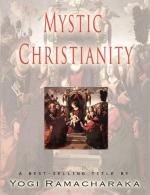St. Clement also quotes approvingly the saying of Plato, that: “We must speak in enigmas; that should the tablet come by any mischance on its leaves either by sea or land he who reads may remain ignorant.” He also says, concerning certain Gnostic writings:
“Let the specimen suffice to those who have ears. For it is not required to unfold the mystery, but only to indicate what is sufficient for those who are partakers in knowledge to bring it to mind.”
We have quoted freely from St. Clement, for the purpose of showing that he, a man in a very exalted position in the Early Christian Church, recognized, and actually taught, the Inner Teachings, or Secret Doctrine of Mystic Christianity—that the Early Christian Church was an organization having a Mystic Centre for the few, and Common Outer for the multitude. Can there be any doubt of this after reading the above words from his pen?
But not only St. Clement so wrote and taught, but many others in authority in the Early Christian Church likewise voiced their knowledge of, and approval in, the Inner Teachings. For example, Origen, the pupil of St. Clement, a man whose influence was felt on all sides in the early days of the Church. Origen defended Christianity from the attacks of Celsus, who charged the Church with being a secret organization which taught the Truth only to a few, while it satisfied the multitude with popular teachings and half-truths. Origen replied that, while it was true that there were Inner Teachings in the Church which were not revealed to the general public, still the Church, in that respect, was but following the example of all teachers of Truth, who always maintained an esoteric side of their teachings for those fitted to participate in them, while giving the exoteric side to the general body of followers. He writes:




